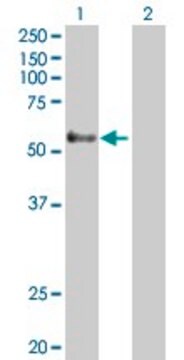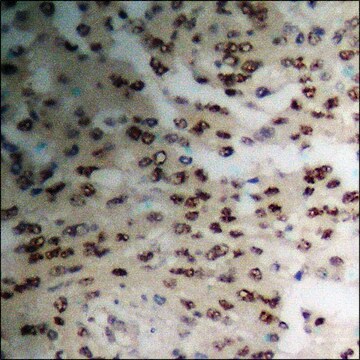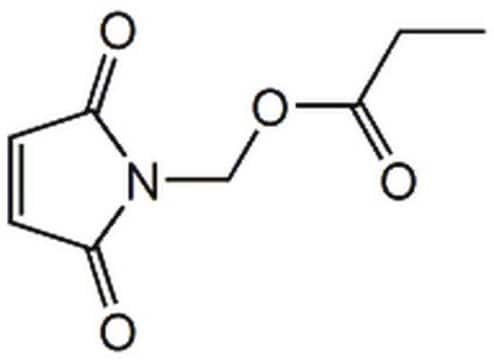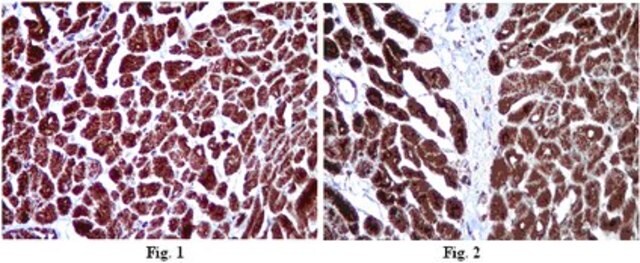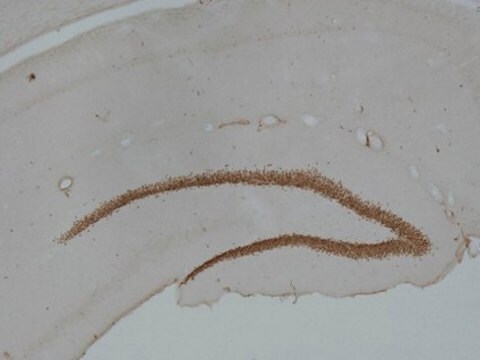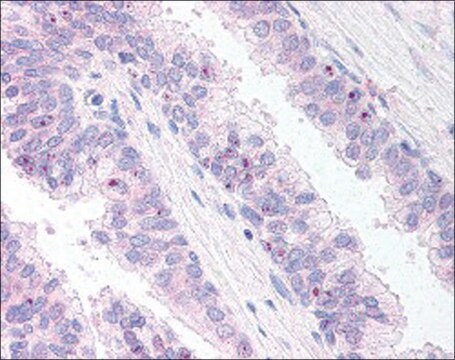추천 제품
생물학적 소스
rabbit
Quality Level
항체 형태
affinity isolated antibody
항체 생산 유형
primary antibodies
클론
polyclonal
정제법
affinity chromatography
종 반응성
rat, human
종 반응성(상동성에 의해 예측)
mouse (based on 100% sequence homology)
기술
immunocytochemistry: suitable
immunoprecipitation (IP): suitable
western blot: suitable
NCBI 수납 번호
UniProt 수납 번호
배송 상태
wet ice
타겟 번역 후 변형
unmodified
유전자 정보
human ... GPR56(9289)
일반 설명
G-protein coupled receptor 56 (GPR56) is a ubiquitous adhesion receptor, which belongs to the G-protein coupled receptor 2 family and LN-TM7 subfamily. It is abundantly expressed in the in thyroid gland, brain, heart, and various tumor cells. Previous studies have suggested that GPR56 may inhibit the progression and metastasis of melanomas by interaction with extracellular-matrix proteins, such as Tissue Transglutaminase. GPR56 also plays a role in regulating VEGF production and angiogenesis via a PKCα-mediated pathway. GPR56 also plays a critical role in the development of the frontal cortex; previous studies have reported that mutations in GPR56 result in disorganized cortical lamination, which is most pronounced in the frontal cortex. This condition is known as bilateral frontoparietal polymicrogyria or BFPP.
면역원
linear peptide corresponding to the C-terminus of Mouse GPR56.
애플리케이션
Immunoprecipitation Analysis: A representative lot of this antibody immunoprecipated GPR56 from rat kidney cell lysate and visualized through western blot (Paavola, K., et al. (2011). J. Biol. Chem. 2011, 286:28914-28921.)
Western Blot Analysis: A representative lot of this antibody detected GPR56 from rat kidney cell lysate (Paavola, K., et al. (2011). J. Biol. Chem. 2011, 286:28914-28921.)
Immunocytochemistry Analysis: A representative lot of this antibody detected GPR56 from transfected HEK293 cells (Paavola, K., et al. (2011). J. Biol. Chem. 2011, 286:28914-28921.)
Western Blot Analysis: A representative lot of this antibody detected GPR56 from rat kidney cell lysate (Paavola, K., et al. (2011). J. Biol. Chem. 2011, 286:28914-28921.)
Immunocytochemistry Analysis: A representative lot of this antibody detected GPR56 from transfected HEK293 cells (Paavola, K., et al. (2011). J. Biol. Chem. 2011, 286:28914-28921.)
This Anti-GPR56, C-terminal Antibody is validated for use in Western Blotting and Immunoprecipitation and Immunocytochemistry for the detection of GPR56, C-terminal.
품질
Evaluated by Western Blotting in Hela cell lysate.
Western Blotting Analysis: 1 µg/ml of this antibody detected GPR56 in 10 µg of Hela cell lysate.
Western Blotting Analysis: 1 µg/ml of this antibody detected GPR56 in 10 µg of Hela cell lysate.
표적 설명
~ 120 kDa observed
This receptor is heavily glycosylated in cells, and thus the apparent molecular mass of the full-length receptor in most cell types is around 90-120 kDa Moreover, this receptor is prone to extensive post-translational processing and proteolysis, and thus depending on the cell type the most prominent immunoreactive bands on Western blot are usually around 45 kDa, 25 kDa and/or 15 kDa in size
This receptor is heavily glycosylated in cells, and thus the apparent molecular mass of the full-length receptor in most cell types is around 90-120 kDa Moreover, this receptor is prone to extensive post-translational processing and proteolysis, and thus depending on the cell type the most prominent immunoreactive bands on Western blot are usually around 45 kDa, 25 kDa and/or 15 kDa in size
기타 정보
Concentration: Please refer to lot specific datasheet.
Not finding the right product?
Try our 제품 선택기 도구.
Storage Class Code
12 - Non Combustible Liquids
WGK
WGK 1
Flash Point (°F)
Not applicable
Flash Point (°C)
Not applicable
시험 성적서(COA)
제품의 로트/배치 번호를 입력하여 시험 성적서(COA)을 검색하십시오. 로트 및 배치 번호는 제품 라벨에 있는 ‘로트’ 또는 ‘배치’라는 용어 뒤에서 찾을 수 있습니다.
Gabriel S Salzman et al.
Proceedings of the National Academy of Sciences of the United States of America, 114(38), 10095-10100 (2017-09-07)
Adhesion G protein-coupled receptors (aGPCRs) play critical roles in diverse biological processes, including neurodevelopment and cancer progression. aGPCRs are characterized by large and diverse extracellular regions (ECRs) that are autoproteolytically cleaved from their membrane-embedded signaling domains. Although ECRs regulate receptor
Ximena Barros-Álvarez et al.
Nature, 604(7907), 757-762 (2022-04-15)
Adhesion G-protein-coupled receptors (aGPCRs) are characterized by the presence of auto-proteolysing extracellular regions that are involved in cell-cell and cell-extracellular matrix interactions1. Self cleavage within the aGPCR auto-proteolysis-inducing (GAIN) domain produces two protomers-N-terminal and C-terminal fragments-that remain non-covalently attached after
자사의 과학자팀은 생명 과학, 재료 과학, 화학 합성, 크로마토그래피, 분석 및 기타 많은 영역을 포함한 모든 과학 분야에 경험이 있습니다..
고객지원팀으로 연락바랍니다.